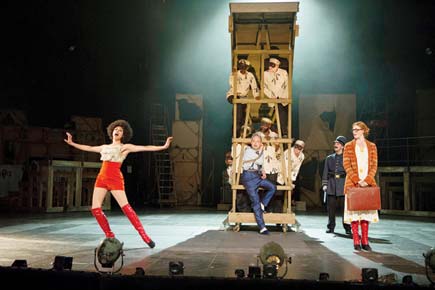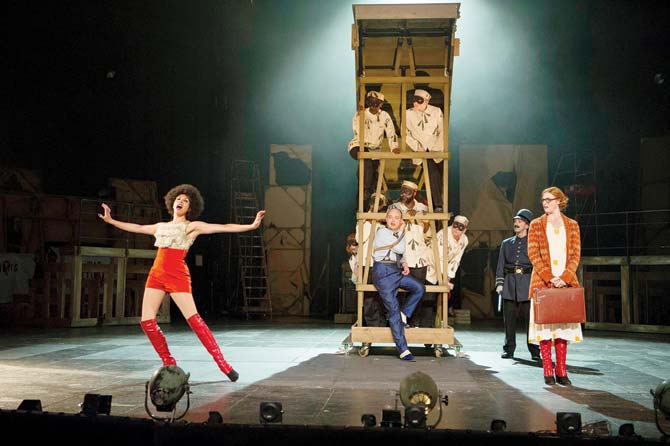The Threepenny Opera remains just as relevant today as it was in 1928, for every society has its share of poverty, crime and corruption


A scene from The Threepenny Opera. Pic/Richard Hubert Smith
 “You see, it is like this. These poorest of the poor — give and it shall be given unto you, and so on — have nothing in the world apart from celebrations. Well, there are various possibilities. Of course, there has to be a criminal. What happens to him is less important. Either they want to see a murderer hanged or they want to see one crowned. All the rest is immaterial.”
“You see, it is like this. These poorest of the poor — give and it shall be given unto you, and so on — have nothing in the world apart from celebrations. Well, there are various possibilities. Of course, there has to be a criminal. What happens to him is less important. Either they want to see a murderer hanged or they want to see one crowned. All the rest is immaterial.”
ADVERTISEMENT
These lines uttered by a character called Peachum in Bertolt Brecht and Kurt Weill’s play The Threepenny Opera, could have been spoken by a man in India. Peachum runs a gang of beggars, and this line of work is only too familiar in Mumbai. But as long as there is poverty and crime, a play like this one will be staged and also find an audience.
A screening of the National Theatre’s (London) production, that has been winning rave reviews, was seen in Mumbai, as part of the NT Live programme, with Rory Kinnear playing the notorious gangster called Mack The Knife. The new adaptation is by award-winning playwright Simon Stephens and directed by Rufus Norris, the current director of the National Theatre, and described as “sexy” in many reviews.
According to website on the musical, “The Threepenny Opera proclaims itself an opera for beggars,” and it was in fact an attempt both to satirise traditional opera and operetta and to create a new kind of musical theatre based on the theories of two young German artists, composer Kurt Weill and poet-playwright Bert Brecht. The show opens with a mock-Baroque overture, a nod to Threepenny’s source, The Beggar’s Opera, a brilliantly successful parody of Handel’s operas written by John Gay in 1728. In a brief prologue following the overture, a shabby figure comes onstage with a barrel organ and launches into a song chronicling the crimes of the notorious bandit and womanizer Macheath, “Mack the Knife.” The setting is a fair in Soho (London), just before Queen Victoria’s coronation… Early in 1928, Kurt Weill and Bertolt Brecht were both regarded as enfants terribles in the world of Weimar culture. They had one obscure collaboration under their belt, Weill’s setting of five of Brecht’s poems about an imaginary city called Mahagonny, and they were already hard at work on the full-length Mahagonny opera, which would cause a scandal and lead to Nazi riots in 1930. But Brecht was also toying with the famous Beggar’s Opera by John Gay, from 1728, which had been revived in London in 1920 and run for years. Elisabeth Hauptmann, Brecht’s assistant and collaborator, introduced him to the piece and translated the English libretto into German.”
The original 1928 production that was not received or reviewer too well initially, went on to become a hit and was hailed as a landmark of twentieth-century musical theatre. It was one of the few musicals that was about beggars, gangsters and hookers, and, of course, the womanising Macheath aka Mack The Knife. It was staged when Germany was going through a tough time, and as a film on the history of the play notes, when the actors were portraying hunger on stage, they were probably hungry in real life.
Michael Billington’s review in The Guardian states, “What does this famous piece of theatre mean to us today? The distinguished translator John Willett got it right when he said it survived less because of its political content than through its establishment of a new theatrical genre. That came home to me while watching Rufus Norris’s grubbily vivacious revival, which doesn’t so much ignite our social anger as remind us that Bertolt Brecht and Kurt Weill proved you can create memorable musical theatre out of exuberant low-life.”
One of the finest Indian adaptations of the play was by the legendary PL Deshpande, directed by Dr Jabbar Patel, called Teen Paishacha Tamasha. The 1978 version of the play made use of the post-Emergency mood to give it a clear political edge. With Nandu Bhende playing Mack, Patel used rock, pop and folk music to enhance the experience of the production.
A more recent production of The Threepenny Opera was Sunil Shanbag’s working with Chetan Datar’s adaptation, called Mastana Rampuri ur Chhappan Chhuri, staged in 2007.
Like all great pieces of work, everyone adapting a Brecht play can make it their own; in every society there is poverty, crime and corruption; what was unique was Brecht’s point of view. In his world, Mack is not punished, because he is a creation of his circumstances. The song ‘What Keeps Mankind Alive’ goes:
You gentlemen who think you have a mission
To purge us of the seven deadly sins
Should first sort out the basic food position
Then start your preaching, that's where it begins
You lot, who preach restraint and watch your waist as well
Should learn, for once, the way the world is run
However much you twist, or whatever lies that you tell
Food is the first thing, morals follow on.
Deepa Gahlot is an award-winning film and theatre critic and an arts administrator. She tweets @deepagahlot. Send your feedback to mailbag@mid-day.com
 Subscribe today by clicking the link and stay updated with the latest news!" Click here!
Subscribe today by clicking the link and stay updated with the latest news!" Click here!







